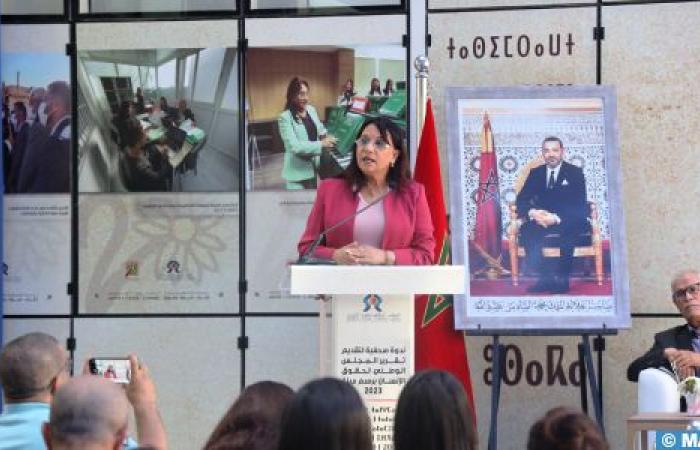Tuesday, July 2, 2024 at 8:40 p.m.
Rabat – The National Human Rights Council (CNDH) published, on Tuesday in Rabat, its annual report for the year 2023 under the theme “Establishment of a national system for the protection of economic and social rights”.
The report, presented by the president of the CNDH, Amina Bouayach, during a press conference, includes a total of 332 thematic or general recommendations, including 122 recommendations issued by the three national mechanisms and 41 structuring recommendations which are addressed to public authorities and relate to the conventional practice of the Kingdom and its interaction with the international human rights system, the legal and institutional framework as well as the field of public policies, programs and practices.
The Council’s recommendations concern the acceleration of the process of adopting fundamental human rights laws, the completion of all components of social protection and the broadening of their scope in order to establish a national system for the protection of economic and social rights, in particular those related to minimum social security standards, namely old-age, unemployment and disability pensions and compensation in the event of accidents at work.
The report also noted an increase in the number of complaints and requests, with the CNDH, its national mechanisms and its regional commissions receiving 3,318 complaints, including 280 from women or girls who were victims of violence, and 276 relating to the rights of migrants. It was also noted that more and more individuals and groups are turning to the regional commissions as recourse mechanisms at the local level.
The Council notes an increase in the proportion of complaints related to economic and social rights, as an indicator of the extent of the difficulties encountered by individuals in accessing basic services related to these rights, and an increase in complaints related to the right to a clean and sustainable environment and the right to water, which can be explained by the difficult situation related to the unprecedented water stress that the country has been experiencing since 2022 and which continued in 2023.
The report also notes that the scope of complaints has expanded to include matters relating to privacy, reflecting the CNDH’s reputation as a non-judicial redress mechanism.
The Council also notes that the dynamics of creating non-governmental organizations continues, with an estimated number of 266,610 NGOs at the end of 2023, spread across all regions of the Kingdom and working in all fields.
The Council also recommended launching a series of consultations between the different civil and institutional actors to revise the law on associations and regulate associative life, taking into account the evolution of the system of rights linked to freedom of association.
On the other hand, the report emphasizes the need to support the CNDH in its interventions related to human trafficking cases, recommending in this sense the development of a guide to strengthen the capacities of its executives at the national and regional levels and adopt a unified working methodology for the processing of this type of case.
This guide will also facilitate the early monitoring and identification of potential victims of this type of crime, for which 110 cases were brought to justice in 2023.
The report also shows the Council’s ability to support public debate on societal issues related to rights and freedoms, both in virtual and real space, which reflects a change in the approach adopted to address urgent issues.
In addition, the CNDH continued its mobilization to ensure the monitoring of the implementation of the remaining recommendations issued by the Equity and Reconciliation Commission (IER), in particular those relating to the preservation of memory, collective and individual rehabilitation and the execution of decisions taken in the context of certain cases of forced disappearance.
In this context, the Council refers to the report of the national mechanism for the prevention of torture, which carried out 55 visits to places of deprivation of liberty, including 15 visits to penitentiary establishments and 26 visits to places of police custody.
These include 8 visits to places belonging to the National Security, 19 to premises belonging to the Royal Gendarmerie, 7 to courts, 5 to child protection centres and one visit to a psychiatric hospital. All these visits were sanctioned by a report from the national mechanism containing observations and recommendations.
The CNDH cites, in the same vein, the report of the national mechanism authorized to receive appeals containing violations of children’s rights, which received a total of 83 complaints in 2023, while the national mechanism for the protection of the rights of persons with disabilities received a total of 32 complaints and requests during the same year.
And to recall that three reports were adopted during 2023 by the UN mechanisms concerning the human rights situation in Morocco, namely the reports on the implementation of the International Convention on the Elimination of All Forms of Racial Discrimination and the International Convention on the Protection of the Rights of All Migrant Workers and Members of Their Families, and the report on the fourth cycle of the Universal Periodic Review, for which 306 recommendations were issued.
The Council stresses that it welcomed the positive interaction of the Moroccan Government with 232 approved recommendations, including recommendations aimed at strengthening the exercise of freedom of expression, opinion, association and assembly. It also encouraged the Government to reconsider its position on some recommendations partially or totally rejected, such as the abolition of the death penalty in law and practice and the criminalization of “marital rape”.
The report highlights that the CNDH has consolidated its leadership within international and regional networks of national human rights institutions, for example by serving as vice-president of the Global Alliance of National Human Rights Institutions and by leading working groups for the Global Alliance and the African Network.
The Council also strengthened its relations with the African Union human rights system, organizing for the first time a major conference on human rights after Morocco’s return to the African Union, as well as the African Forum on Transitional Justice.
The report concludes that consolidating the foundations of the national system for the protection of economic and social rights requires accelerating education reform to guarantee the right to quality education for all and strengthen national human capital.
He also advocates the continuation of tax reform and the implementation of all the provisions of the framework law on tax reform as an essential element for financing economic and social rights and strengthening territorial justice.






